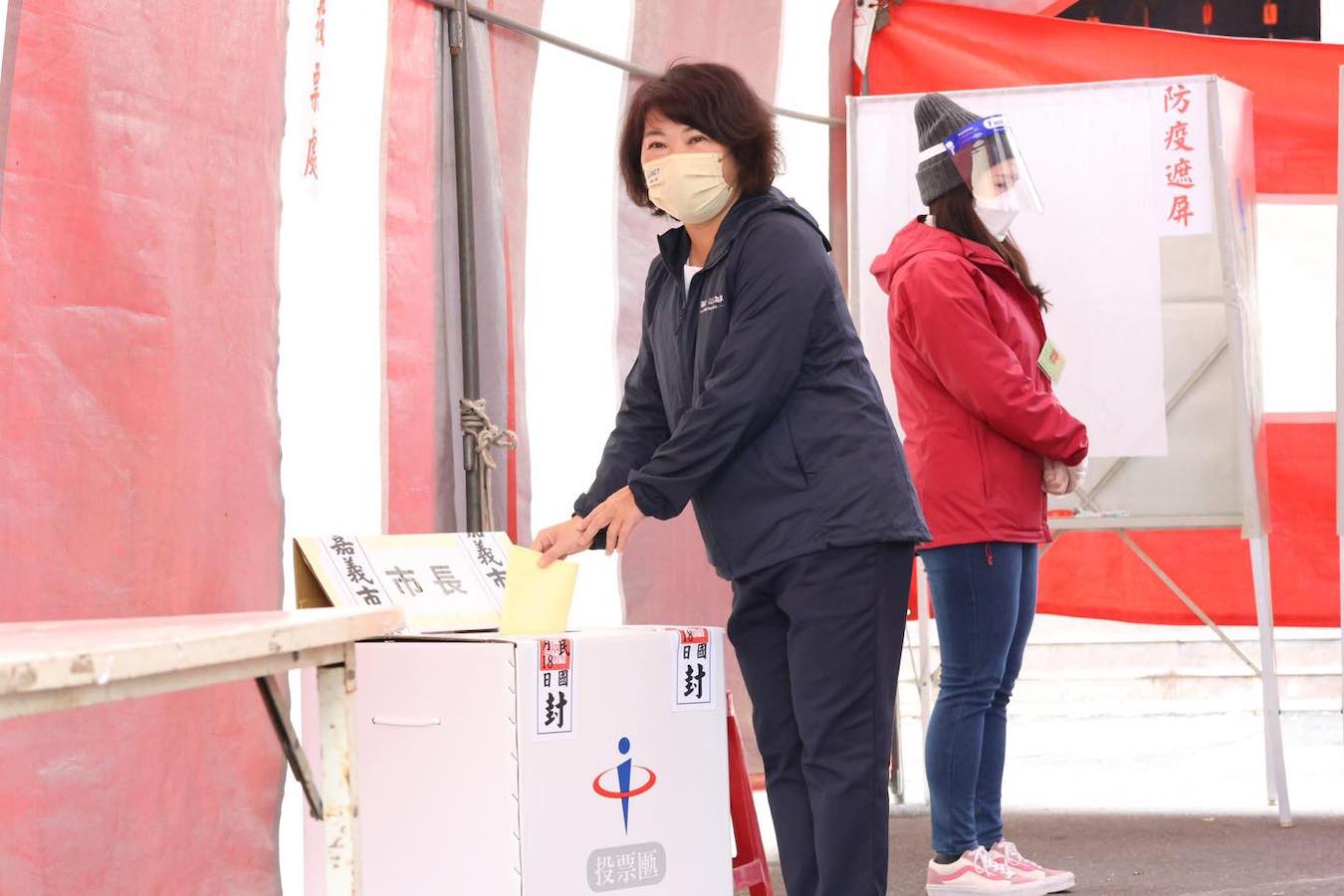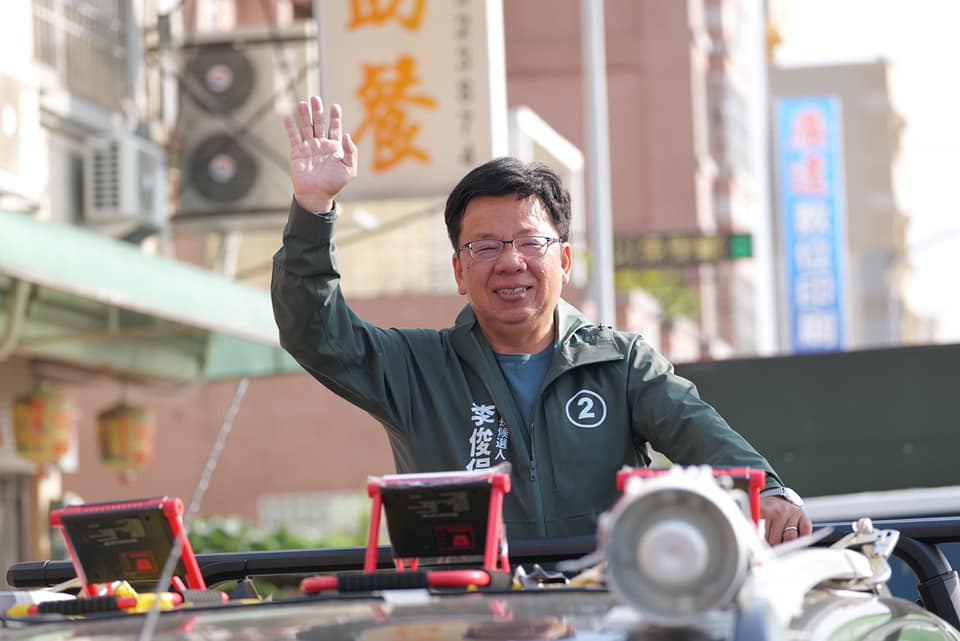by Brian Hioe
語言:
English
Photo Credit: Huang Min-hui/Facebook
THE DPP SUFFERED a loss in the Chiayi mayoral election over the weekend. This adds another defeat to the losses suffered by the DPP in nine-in-one elections.
Although other races were held on November 26th, the vote for Chiayi was instead held on December 18th. The vote was scheduled after the death of independent candidate Huang Shao-tsung on November 2nd.
While Huang was unlikely to win the election, provisions in Article 30 of the Civil Servants Election and Recall Act specify that elections be rescheduled in the event of the death of a candidate between election registration and voting day. These provisions are intended to prevent political assassinations.
 Huang Min-hui of the KMT casting her vote. Photo credit: Huang Min-hui/Facebook
Huang Min-hui of the KMT casting her vote. Photo credit: Huang Min-hui/Facebook
Nevertheless, as no foul play was suspected in Huang’s death, there were calls on the Central Election Commission not to reschedule the vote. Part of the criticism was that the election outcome of the nine-in-one elections would affect the Chiayi mayoral vote, rather than the elections taking place all at once.
Either way, the result was a loss for the DPP’s candidate, Lee Chun-yi, to the KMT’s Huang Min-hui. Lee won 59,874 votes compared to Huang’s 32,790 votes, or 63.82% of the vote compared to 34.95%. The results of the election were clear quite quickly, with Huang declaring victory only 75 minutes after polls closed.
Huang was the incumbent and was seeking a second term. However, Huang also served as Chiayi mayor for two terms from 2005 to 2014. If Huang finishes her term, she will be the longest-serving local government head in Taiwanese history.
193 polling stations were set up for Chiayi’s electorate of 214,130 voters. However, voter turnout was only around 44%. Warnings ahead of time were that the rescheduled vote and cold weather could affect the turnout.
The DPP under acting chair Chen Chi-mai has apologized for its defeat in the Chiayi by-election. It is not unusual for the party to turn its attention to a local race, recall, or referendum to try and make up for an election defeat, such as the DPP faced in late November. But this was clearly not successful either, with voters not having turned out in high enough numbers to remedy the election loss.
Either way, the outcome of the Chiayi city council election resulted in a close to even split for the pan-Blue and pan-Green camps. Of 23 seats, six are held by the DPP and KMT each, one by the NPP, and ten by independents. Likewise, DPP incumbent Weng Chang-liang won reelection in the neighboring Chiayi county magistrate race, handily defeating his opponent, legislator Wang Yu-min of the KMT, by large margins. Wang won 101,517 votes, or 37.15% of the vote, while Weng won 171,777 votes or 62.85% of the vote.
More generally, the Chiayi mayoral race would not have changed the narrative on the 2022 nine-in-one election regardless of the outcome. The nine-in-one election was a rout for the DPP, after all, which only won five municipalities–the lowest in the party’s history, and down from the previous low of six in 2018.
 Lee Chun-yi of the DPP thanking voters after his defeat by truck. Photo credit: Lee Chun-yi/Facebook
Lee Chun-yi of the DPP thanking voters after his defeat by truck. Photo credit: Lee Chun-yi/Facebook
But the election results have not been interpreted as a change in the status quo of Taiwanese politics, much as the DPP’s defeats in 2018 were seen as a significant development. The DPP has always struggled when it comes to local politics, given the KMT being more deeply rooted in local-level politics through clientelist and patronage networks that date back to the authoritarian period. By contrast, the DPP performs better with regard to legislative and presidential elections that occur on the national level and which foreground cross-strait issues.
Moreover, in this set of elections, there was no phenomenon analogous to the 2018 “Han wave,” which saw the KMT unexpectedly make inroads into the DPP’s heartland in southern Taiwan and catapulted victorious Kaohsiung mayor Han Kuo-yu to national fame. Subsequently, this put Han in a position to become the KMT’s 2020 presidential candidate, though his run was ultimately a dismal failure for the KMT.
In the meantime, some questions persist about pan-Blue wins in the last set of elections. Namely, a number of victorious pan-Blue candidates are under investigation for corruption charges, including but not limited to incumbent Yilan county magistrate Lin Zi-miao of the KMT, Hsinchu mayor-elect Ann Kao of the TPP, and pan-Blue independent Miaoli county magistrate-elect Chung Tung-chin. It is possible that these charges will result in their removal from office, which may prove somewhat of a damper on the pan-Blue camp’s victories.

